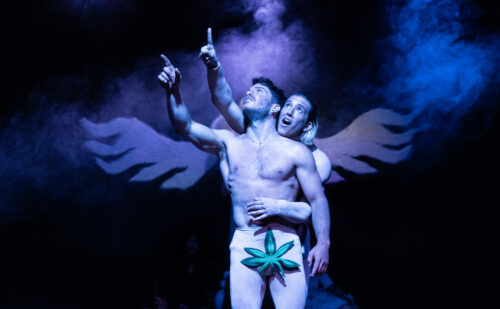Text-ture
Intensive Workshop for Third and Fourth year
Two Weeks during Semester B
Tomer Damsky
Tomer Damsky is a Barcelona-based sound artist, choral leader, and interdisciplinary researcher working between early music, folk, metal, and experimental composition. Her research focuses on the intersections of historical sound studies, mystical literature, and the reconstruction of archival materials into new sonic forms.
Currently a PhD candidate at the Orpheus Institute, Royal Conservatoire Antwerp, and the Ruusbroec Institute for the History of Spirituality, Damsky also lectures at the School of Visual Theater and the Musrara School of Art in Jerusalem and teaches regularly on interdisciplinary platforms worldwide.
As a vocalist, choral composer, and self-taught conductor, she has performed with diverse vocal ensembles and led choirs across Israel, Spain, Italy, and Belgium. She founded and directs the Quantum Choir, which merges contemporary creation with extreme interpretations of folk and liturgical music, as well as the all-actress Coro del Gallinero in Catalonia.
Damsky has collaborated as a composer with ensembles such as Chœurs de Jeunes de la Monnaie (Belgium) and Ensemble Mazì (Italy). She actively creates, performs, and designs sound for theater, dance, and film, while recording and touring with her own bands.
She fronts the Belgian-based doom project Atonia and the industrial audiovisual trio Wackelkontakt, with releases on labels from Spain, France, Germany, and Belgium, and performances in major international venues including Zurich, New York, Paris, and Barcelona.
As an artistic researcher, Damsky has worked with the Jewish Music Institute (London) and the Jewish Music Research Center (Jerusalem), presenting at CERCCA (Barcelona), DeSingel (Antwerp), the International Medieval Congress (Leeds), and La Voce Artistica (Ravenna). She won the 2024 Polonsky Prize for Creativity and Originality in the Humanities and is a 2025–2026 resident at Britten Pears Arts, UK.
tomerdamsky.com

In this intensive workshop, we will explore, deconstruct, and reconstruct together sonic and musical mechanisms, while examining how human voice, language, space and time intersect at the edges of performance creation. We will study the axis between the theoretical (thinking of sound as shaping our perception of space and time) and the practical (practicing and experimenting in sonic-vocal-perceptual spaces, where we will be both the scientists and the subjects of our study). We will leap between scientific-philosophical-artistic theories, developing sonic curiosity and skilled listening. We will learn about the relationship between the auditory system and the human voice system; we will playfully deconstruct and reconstruct choral and vocal mechanisms; we will practice techniques that activate the brain areas responsible for rhythm, synchronization, and auditory perception; we will perform scores from different traditions of text-ture based music; we will examine how sound and listening are forces of discipline as well as liberation, activating the senses and opening a channel to consciousness; and finally, we will attempt to deconstruct our perception of sound, and to question how it relates to the way we understand (or don’t understand) the world.







